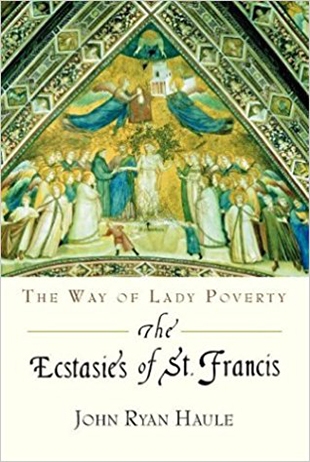"Francis's primary 'technique of ecstasy' was his practice of poverty. On the one hand it amounted to a systematic reversal of everything his father stood for; and since his father was a remarkably successful merchant, Francis's inversion constituted a repudiation of the profane world in precisely that sector in which it was most successful. The foundations of modern capitalism were being laid very effectively by Pietro di Bernardone and his cohorts; feudalism was failing; and the nobility was beginning a decline which would become evident in the next two centuries. Francis seized upon the central premise of capitalism, acquisition and financial leverage, and turned it inside out. He became a dedicated spendthrift. Everything that fell into his hands by humble labor, begging, or the spontaneous generosity of his admirers, he gave away at his earliest opportunity. His competitors were not the upwardly mobile but society's outcasts and downtrodden. If he found a beggar whose clothes were more worn out and patched than his own, he offered an exchange. He traded downward as resolutely as his father traded upward.
"For Francis, no dependable security was to be found in clothing, shelter, money in the bank, or the praise of his contemporaries. These were the things that might have kept him in the kingdom of this world and shut off his access to the kingdom of heaven. He strove to depend without reserve on the providence of a God who clothes the lilies of the field and the birds of the air more gloriously than Solomon. Free-spending poverty was his spiritual practice, his technique of ecstasy. Every move in the strategy of poverty removed another stone from the foundation of the profane world and firmed up the spiritual undergirding of the sacred cosmos.
"Although he looked to the gospel stories of Jesus for his model in the practice of poverty, he had to undergo an intensive learning process to determine which acts could be most effective in changing his consciousness or (what amounts to the same thing) transforming the world, rearranging the profane into the sacred. He had to learn that each moment presents its own opportunity, that nothing can be planned in advance, that moment-to-moment living is the only reliable teacher. Indeed, the God who clothes the lilies of the field and the birds is present in each moment, giving Francis the circumstances and the challenge wherein the spiritual response to poverty is to be discovered. Each moment is potentially an opportunity for an exchange with God. God speaks in providing the circumstances, Francis responds by giving some thing away. A divine/human dialogue occurs in every moment in time. To be conscious of this and to act upon it is to abolish profane time and open up the sacred timelessness of God's world.”
Back to reading a full review of this book.
